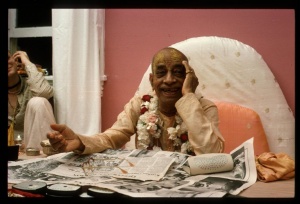SB 4.28.11: Difference between revisions
m (1 revision(s)) |
(Vanibot #0054 edit - transform synonyms into clickable links, which search similar occurrences) |
||
| (One intermediate revision by one other user not shown) | |||
| Line 1: | Line 1: | ||
{{info | {{info | ||
|speaker= | |speaker=Nārada Muni | ||
|listener=King | |listener=King Prācīnabarhiṣat | ||
}} | }} | ||
[[Category:Srimad-Bhagavatam - Canto 04 Chapter 28]] | |||
[[Category:Bhagavatam Verses Spoken by Narada Muni - Vanisource|042811]] | |||
<div style="float:left">'''[[Srimad-Bhagavatam]] - [[SB 4|Fourth Canto]] - [[SB 4.28: Puranjana Becomes a Woman in the Next Life|Chapter 28: Purañjana Becomes a Woman in the Next Life]]'''</div> | |||
<div style="float:right">[[File:Go-previous.png|link=SB 4.28.10]] '''[[SB 4.28.10]] - [[SB 4.28.12]]''' [[File:Go-next.png|link=SB 4.28.12]]</div> | |||
{{RandomImage}} | |||
==== TEXT 11 ==== | ==== TEXT 11 ==== | ||
<div | <div class="verse"> | ||
bhaya-nāmno 'grajo bhrātā | :bhaya-nāmno 'grajo bhrātā | ||
prajvāraḥ pratyupasthitaḥ | :prajvāraḥ pratyupasthitaḥ | ||
dadāha tāṁ purīṁ kṛtsnāṁ | :dadāha tāṁ purīṁ kṛtsnāṁ | ||
bhrātuḥ priya-cikīrṣayā | :bhrātuḥ priya-cikīrṣayā | ||
</div> | </div> | ||
| Line 16: | Line 22: | ||
==== SYNONYMS ==== | ==== SYNONYMS ==== | ||
<div | <div class="synonyms"> | ||
bhaya- | ''[//vanipedia.org/wiki/Special:VaniSearch?s=bhaya&tab=syno_o&ds=1 bhaya]-[//vanipedia.org/wiki/Special:VaniSearch?s=nāmnaḥ&tab=syno_o&ds=1 nāmnaḥ]'' — of Bhaya (Fear); ''[//vanipedia.org/wiki/Special:VaniSearch?s=agra&tab=syno_o&ds=1 agra]-[//vanipedia.org/wiki/Special:VaniSearch?s=jaḥ&tab=syno_o&ds=1 jaḥ]'' — elder; ''[//vanipedia.org/wiki/Special:VaniSearch?s=bhrātā&tab=syno_o&ds=1 bhrātā]'' — brother; ''[//vanipedia.org/wiki/Special:VaniSearch?s=prajvāraḥ&tab=syno_o&ds=1 prajvāraḥ]'' — named Prajvāra; ''[//vanipedia.org/wiki/Special:VaniSearch?s=pratyupasthitaḥ&tab=syno_o&ds=1 pratyupasthitaḥ]'' — being present there; ''[//vanipedia.org/wiki/Special:VaniSearch?s=dadāha&tab=syno_o&ds=1 dadāha]'' — set fire; ''[//vanipedia.org/wiki/Special:VaniSearch?s=tām&tab=syno_o&ds=1 tām]'' — to that; ''[//vanipedia.org/wiki/Special:VaniSearch?s=purīm&tab=syno_o&ds=1 purīm]'' — city; ''[//vanipedia.org/wiki/Special:VaniSearch?s=kṛtsnām&tab=syno_o&ds=1 kṛtsnām]'' — wholesale; ''[//vanipedia.org/wiki/Special:VaniSearch?s=bhrātuḥ&tab=syno_o&ds=1 bhrātuḥ]'' — his brother; ''[//vanipedia.org/wiki/Special:VaniSearch?s=priya&tab=syno_o&ds=1 priya]-[//vanipedia.org/wiki/Special:VaniSearch?s=cikīrṣayā&tab=syno_o&ds=1 cikīrṣayā]'' — in order to please. | ||
</div> | </div> | ||
| Line 23: | Line 29: | ||
==== TRANSLATION ==== | ==== TRANSLATION ==== | ||
<div | <div class="translation"> | ||
Under the circumstances, the elder brother of Yavana-rāja, known as Prajvāra, set fire to the city to please his younger brother, whose other name is fear itself. | Under the circumstances, the elder brother of Yavana-rāja, known as Prajvāra, set fire to the city to please his younger brother, whose other name is fear itself. | ||
</div> | </div> | ||
| Line 30: | Line 36: | ||
==== PURPORT ==== | ==== PURPORT ==== | ||
<div | <div class="purport"> | ||
According to the Vedic system, a dead body is set on fire, but before death there is another fire, or fever, which is called prajvāra, or viṣṇu-jvāra. Medical science verifies that when one's temperature is raised to 107 degrees, a man immediately dies. This prajvāra, or higher fever, at the last stage of life places the living entity in the midst of a blazing fire. | According to the Vedic system, a dead body is set on fire, but before death there is another fire, or fever, which is called ''prajvāra'', or ''viṣṇu-jvāra''. Medical science verifies that when one's temperature is raised to 107 degrees, a man immediately dies. This ''prajvāra,'' or higher fever, at the last stage of life places the living entity in the midst of a blazing fire. | ||
</div> | </div> | ||
__NOTOC__ | |||
<div style="float:right; clear:both;">[[File:Go-previous.png|link=SB 4.28.10]] '''[[SB 4.28.10]] - [[SB 4.28.12]]''' [[File:Go-next.png|link=SB 4.28.12]]</div> | |||
__NOTOC__ | |||
__NOEDITSECTION__ | |||
Latest revision as of 21:43, 18 February 2024

A.C. Bhaktivedanta Swami Prabhupada
TEXT 11
- bhaya-nāmno 'grajo bhrātā
- prajvāraḥ pratyupasthitaḥ
- dadāha tāṁ purīṁ kṛtsnāṁ
- bhrātuḥ priya-cikīrṣayā
SYNONYMS
bhaya-nāmnaḥ — of Bhaya (Fear); agra-jaḥ — elder; bhrātā — brother; prajvāraḥ — named Prajvāra; pratyupasthitaḥ — being present there; dadāha — set fire; tām — to that; purīm — city; kṛtsnām — wholesale; bhrātuḥ — his brother; priya-cikīrṣayā — in order to please.
TRANSLATION
Under the circumstances, the elder brother of Yavana-rāja, known as Prajvāra, set fire to the city to please his younger brother, whose other name is fear itself.
PURPORT
According to the Vedic system, a dead body is set on fire, but before death there is another fire, or fever, which is called prajvāra, or viṣṇu-jvāra. Medical science verifies that when one's temperature is raised to 107 degrees, a man immediately dies. This prajvāra, or higher fever, at the last stage of life places the living entity in the midst of a blazing fire.